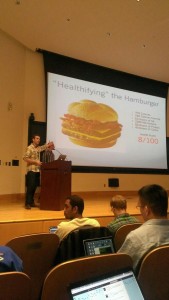The inaugural Philly Health Codefest was hosted April 5-7 by Drexel University’s College of Information Science and Technology. The programming event aimed to transform data into health care solutions.
Held in the Mitchell Auditorium, the event was open to students and professionals interested in software design and development, computer engineering, business, and health care. Teams were formed to develop Web tools that would improve health care in any capacity. The teams were free to choose a topic within health care that their application would target, ranging from food to hospital efficiency tools.
Nine teams spent 36 hours developing prototypes mostly from scratch. Progress made by teams that collaborated before the event was reported to the judges, a panelist of coding experts who considered only the progress made during Codefest. Of the nine teams, four won cash prizes.
A team of four Drexel students, Vitamin.ME, took second place and won $3,000. Computer engineering students Mayank Gureja, a senior, and Matthew Coppala, a junior, along with senior computer science students Ayush Sobti and Anthony Hurst, developed the only mobile application. The app allows users to search for recipes based on specific dietary needs. For example, if the user needs to increase intake of specific vitamins, more carbohydrates or more fat, the app provides recipes to fulfill the user’s precise need. Members of Team Vitamin.ME met through Drexel and developed the idea only about a day before Codefest.
“We actually met the night before and sort of brainstormed what we might want to do,” Sobti said. The team only made an app for the Android platform due to time constraints and familiarity with Java coding language.
From then on, Gureja explained, “It was pretty compartmentalized. Ayush was working on the server and making the [application programming interface], I was responsible for one particular part of the URL, and so were Anthony and Matt. We all developed separately and then made sure it worked individually and then got on my computer to put it all together. If it wasn’t a hack-a-thon, we would have done it a different way.”
Vitamin.ME also won a $1,000 award for Majority Student Team Innovation, a $500 People’s Choice award, a $500 Best Mobile App award and a $500 Alliance Global Service Award for Most User Friendly. They plan to have the app on the market by the end of the spring term.
Although the teams are given 36 hours to work, Vitamin.ME made sure to get some rest. “We slept Friday. We worked until about 3 a.m. and came back to work around 1 in the afternoon on Saturday … and then didn’t sleep again until Sunday evening,” Gureja explained.
“I’ve done a few Codefests before, and what I’ve learned is that the last few hours just before you present is crunch time, and if you haven’t slept the night before, you won’t be productive at all,” Sobti added.
Team Goodeats, another all-Drexel team, also made sure to get plenty of sleep. Team Goodeats was made up of sophomore computer science majors Kumal Mailk and Tushar Soni and sophomore information systems student Nishtha te Dalal. “It was like six-seven hours of sleep both nights,” Soni said.
Through trial and error, the team spent the first 24 hours testing and scrapping ideas. The idea for the final product was created only 12 hours before the end of the event.
Eventually, Team Goodeats came up with the idea to create a food-ordering site that provided detailed nutritional data for courses at various restaurants. Users could type in a ZIP code, sourced from FourSquare’s database. After reviewing the nutritional data, users could order meals through the website, which would automatically call the restaurant. They explained that it was much like GrubHub but took out the use of a tablet-app that often complicates orders by serving as a middleman. Once the order was placed, the recording would then play back the list to the user so the user could confirm that it was correct.
Because the first line of code was written so late in the event, Goodeats did not have time to create a PowerPoint presentation and was only able to show a demo of the development. In the end, the development won Goodeats the $2,000 iSchool Award for Team Innovation and a $1,500 National Science Foundation Center for Visual and Decision Informatics Award for Innovation. They do not plan to commercialize the app anytime soon.
“Now we know we can come up with a quite polished product in less than 12 hours. We know we can write ‘this much’ code in that period of time, so if we had 24 hours or 30 hours to work on it, we could have made something much better,” Soni said.
“If we came in with the idea, we could have developed it as we were going. Instead, at 8 p.m. we knew if we tried to add anything more, it would mess everything up,” Dalal said. She also noted, “It was tough going up against Ph.D. students and presidents of companies. They were presenting, and we thought we lost because they had legitimate plans and we had nothing but a demo.”
This was the sophomore team’s first Codefest. However, they plan to enter more together in the coming months.
The first-place team, Healthify.me, won $5,000 for using a crowdsourced, data-driven approach to develop a website that allows people to find healthy food replacements for their unhealthy favorites. They also received a $500 bonus for developing the most scalable design.
The last cash prize was awarded to Team Hospital Query. This proposal evaluated the performance of hospitals, comparing them to others in the area. A $500 prize and an iPad Mini were awarded for Venture Capitalist’s Choice and Best Use of Tokbox.


